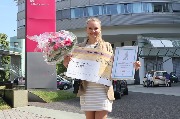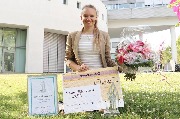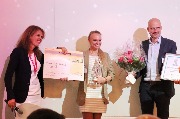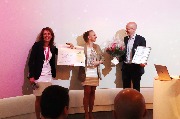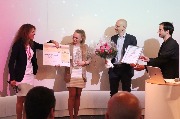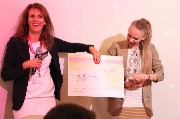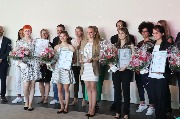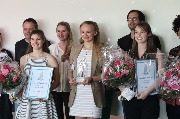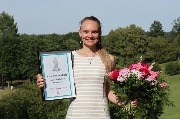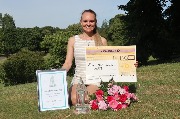MAI Graduate Wins STEM Award 2019
Anastasia Zhukova, a graduate of Institute No. 3 "Control Systems, Informatics and Power Engineering” of the Moscow Aviation Institute (National Research University), became the absolute winner in the STEM Award 2019 for women. Anastasia’s diploma project “Automated Identification of Framing by Word Choice and Labeling to Reveal Media Bias in News Articles”, on which she worked as part of a Master's degree program at the University of Konstanz (Germany), was admitted as the best in the nomination "Artificial Intelligence" and recognized as the absolute winner.
The scientific interests of Anastasia Zhukova lie in the field of information technology and are focused on the study of issues of search, analysis and data visualization. The graduation project aims to automatically identify specific cases of media bias, which consist of a different choice of phrases used by the media to describe the same agents in the covered news stories, which ultimately helps news consumers to more effectively learn about bias in news coverage using specially developed algorithm.
Anastasia is currently studying and preparing to defend her PhD degree at the University of Wuppertal (Germany). We managed to talk with Anastasia after the publication of the results of the competition.
- Anastasia, in Russia in recent years there has been a lot of talk about the reliability of information in the media. Does your application help determine the accuracy of the information?
- I am dealing with the question of how certain essence is represented in the news, and whether the emotional color that affects the perception of this essence by readers can be laid there. Despite the fact that this can be used to partially identify fakes, my work is a separate topic.
- Please tell us more about the project. What tasks is it created for?
- In Russia, there has been a lot of talk about fake news, but in a broad context, the topic of bias in information communications is well known to political scientists, sociologists, and media researchers. They have studied the bias of the news for at least the past 50 years. The difficulty is that all this is not automated. For this kind of research, you need to read the text, manually select the words and phrases based on the hypothesis, plus it takes a lot of time to interpret certain parts of the text. It turns out, you read, you select, and then you systematize the data for a very long time. Such studies have been carried out for a very long time, a lot of people are involved in such projects. As a rule, the professor launches a large project to analyze the news, attracts students who read, highlight and subjectively determine what impact this text had on the reader.
- What is the application capable of at the moment?
- I have an algorithm that analyzes a group of news articles connected by a single plot, and I have a visualization that allows you to see how a particular research object is mentioned in different articles, and compare the words and phrases that the media used to describe different entities and agents.
- How was the work on the project organized?
- My thesis is part of a large project to determine the bias of the news. We divided our project into two parts: firstly, we are engaged in the search for mentions related to a certain acting character, to which my graduation project is devoted. The second part of the project relates to determining people's perception of a character’s mention, how they would interpret this mention and, ultimately, we help political scientists to predict how readers will essentially retell a certain news story based on the interpretation of the information received.
- How did you get the idea to participate in the STEM Award 2019 competition?
- In Germany, there is a campaign to attract girls to technical specialties, and as part of this campaign, Deutsche Telekom, the largest telecommunications company in Germany, came up with such an award for graduates of undergraduate and graduate programs to help young professionals tell the world about the results of their scientific work. All female students can participate. According to the terms of the competition, it was necessary to send his thesis, which corresponds to the five development sectors of Deutsche Telekom: cloud service, cybersecurity, networks of the future, the Internet of things and artificial intelligence. At that time, I had been engaged in a graduation project for two years and I wanted more people to find out about my work, share their results and talk about our research project on bias news, in which several researchers are involved.
- What are your impressions of participating in the contest and victory?
- I was pleased that this topic was perceived as something necessary and useful for society. Although I know that my project has certain shortcomings and this is only a small part of a lot of work, and we are only at the very beginning of the journey!
- We wish you success and further development!
- Thanks for the wish.
